Key takeaways
- Confucian ethics emphasizes self-cultivation, guiding individuals to reflect on their actions and align them with their values.
- Education, informed by Confucian principles, is about nurturing character and fostering a collaborative community rather than just acquiring knowledge.
- Practicing virtues like benevolence and righteousness enhances relationships and encourages meaningful interactions in daily life.
- Applying Confucian ethics involves navigating modern complexities while remaining committed to lifelong personal growth and ethical behavior.
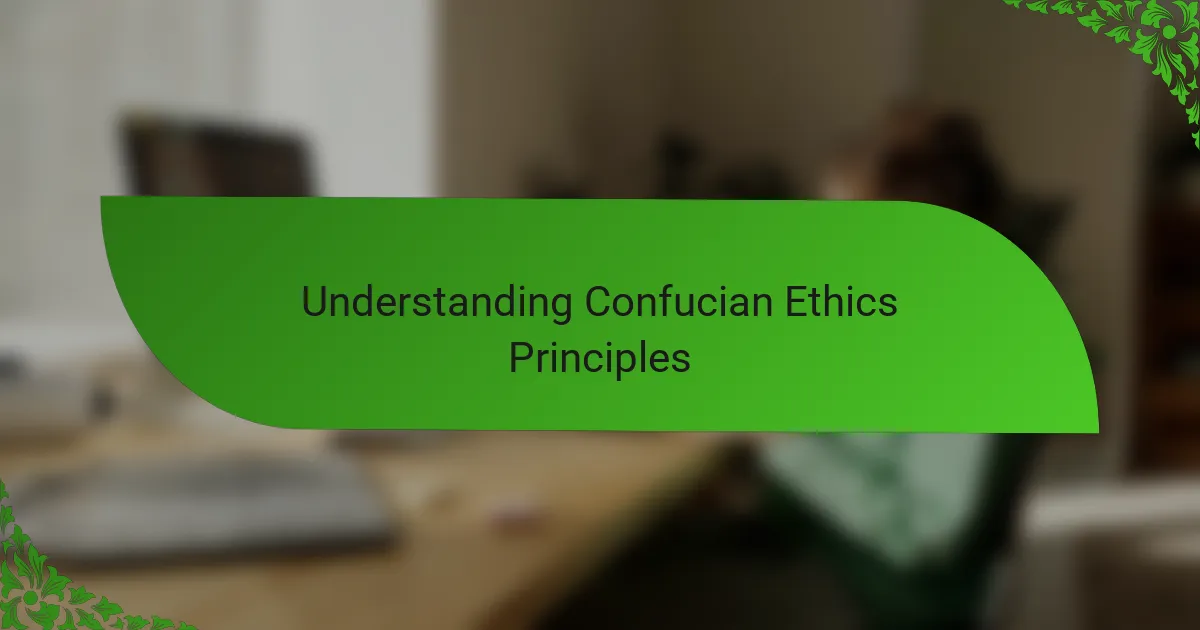
Understanding Confucian Ethics Principles
When I first encountered Confucian ethics, I was struck by its emphasis on virtues like benevolence (ren), righteousness (yi), and propriety (li). These aren’t just abstract ideas; they felt deeply practical, guiding how I interact with others daily. Have you ever noticed how small acts of kindness can ripple through a community? That’s exactly what ren encourages.
What fascinated me most was the idea that ethical behavior starts with self-cultivation. Confucius didn’t suggest rigid rules but a personal commitment to becoming a better person. It made me reflect: How often do I pause to consider whether my actions are aligned with my values? This principle inspired me to take responsibility for my character development seriously.
I also appreciated how Confucian ethics stresses relationships—family, friends, society—and how each role carries obligations. It made me realize that ethics isn’t just a private matter but a social glue that holds communities together. Have you ever thought about how much your behavior impacts those around you? This relational focus brought a meaningful depth to my ethical understanding.
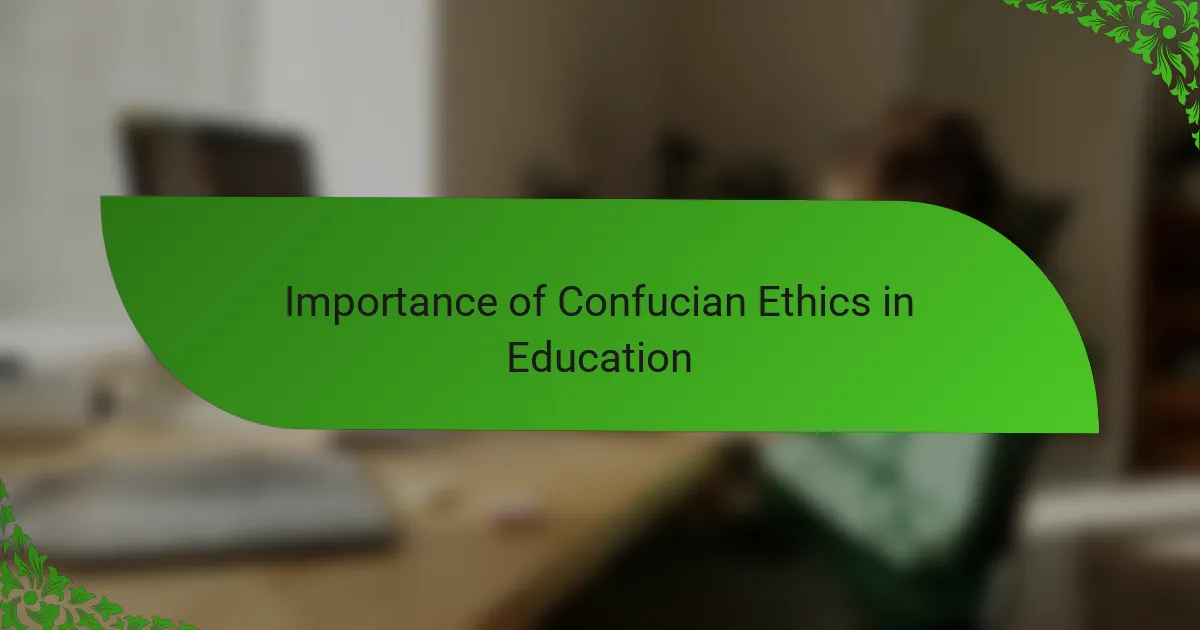
Importance of Confucian Ethics in Education
Confucian ethics has shown me that education isn’t just about acquiring knowledge; it’s about shaping character. When I began applying its principles in the classroom, I noticed a shift—not just in myself, but in how students related to one another. Have you ever experienced a learning environment where respect and kindness feel natural? That’s the power of Confucian virtues in education.
What struck me most was how Confucian ethics encourages educators to lead by example. It made me question, am I embodying the values I hope to instill? This reflection deepened my commitment to ethical teaching and helped create a more harmonious space for learning.
Incorporating Confucian ethics also reminded me that education is a social responsibility. It’s not only about individual achievement but about cultivating a community where everyone contributes to mutual growth. I’ve seen firsthand how this perspective nurtures empathy and cooperation among students, making education more meaningful and lasting.
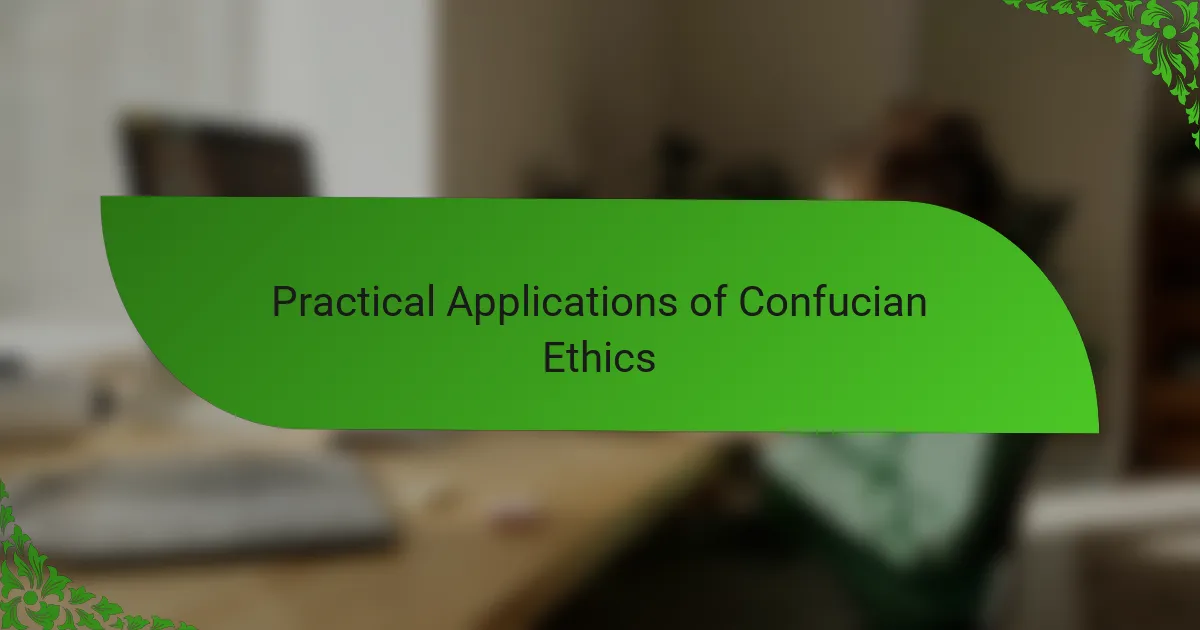
Practical Applications of Confucian Ethics
Applying Confucian ethics in daily life quickly showed me how ren, or benevolence, can transform ordinary interactions. I started consciously practicing small acts of kindness—whether helping a colleague or listening attentively to a friend—and noticed that these gestures created a more trusting and supportive environment around me. Have you ever experienced how a simple kind word can brighten someone’s day unexpectedly? That’s ren at work.
Righteousness (yi) challenged me to make decisions that align with what’s morally right, even when it’s inconvenient. I remember a situation at work where cutting corners seemed easier, but reflecting on yi pushed me to choose integrity instead. It felt uncomfortable at first, but standing by that choice gave me a sense of true confidence and peace.
Confucian ethics’ emphasis on propriety (li) made me rethink how rituals and etiquette shape respect in relationships. From greeting elders to mindful communication, these practices cultivated harmony in my family and social circle. Isn’t it interesting how simple gestures grounded in respect can deepen connections and prevent conflicts before they start?
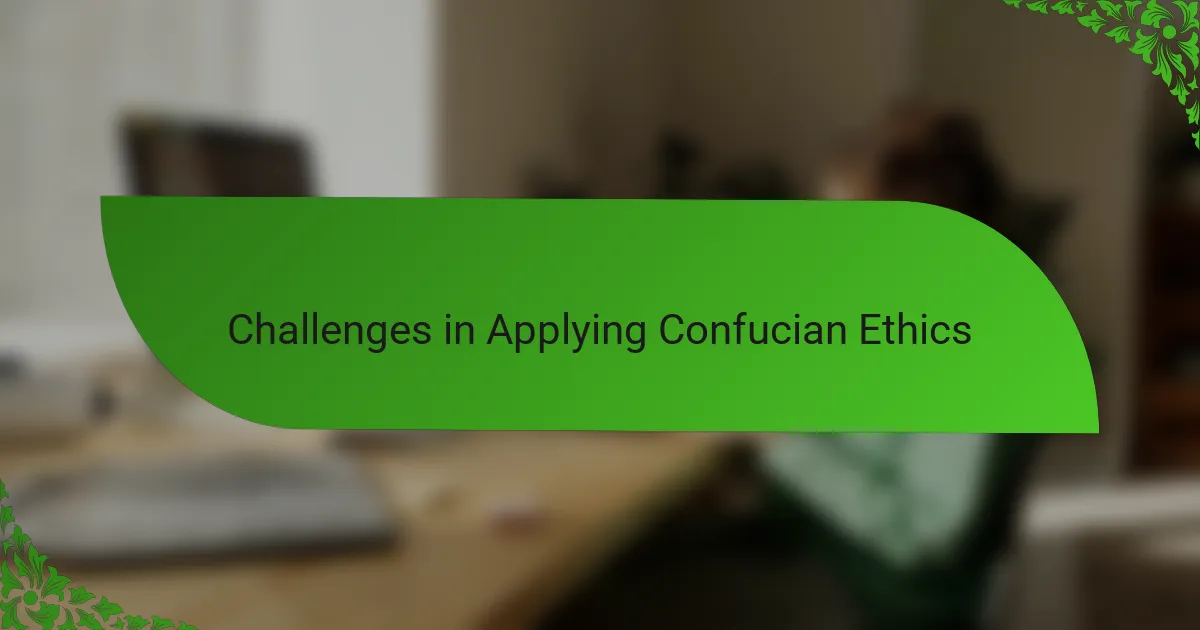
Challenges in Applying Confucian Ethics
One challenge I often faced in applying Confucian ethics was balancing traditional expectations with modern realities. For instance, the emphasis on filial piety felt sometimes overwhelming when personal ambitions or different cultural values came into play. Have you ever struggled to meet obligations to family and society while wanting to carve your own path? That tension made me realize how complex living these ideals can be.
Another difficulty was interpreting the concept of propriety (li) in diverse social contexts. Confucius highlighted rituals and etiquette as essential for harmony, but I found it tricky to adapt these customs in a fast-paced, globalized environment where norms constantly shift. This made me question: How can we honor age-old practices without feeling constrained by them? Navigating this balance required thoughtful reflection and flexibility.
Finally, the inner work of self-cultivation demanded significant patience and persistence. Confucian ethics isn’t about quick fixes but a lifelong commitment to improving oneself. At times, I felt frustrated when progress seemed slow or setbacks occurred. Yet, isn’t personal growth always a challenging journey? Embracing this struggle became part of the ethical path itself.
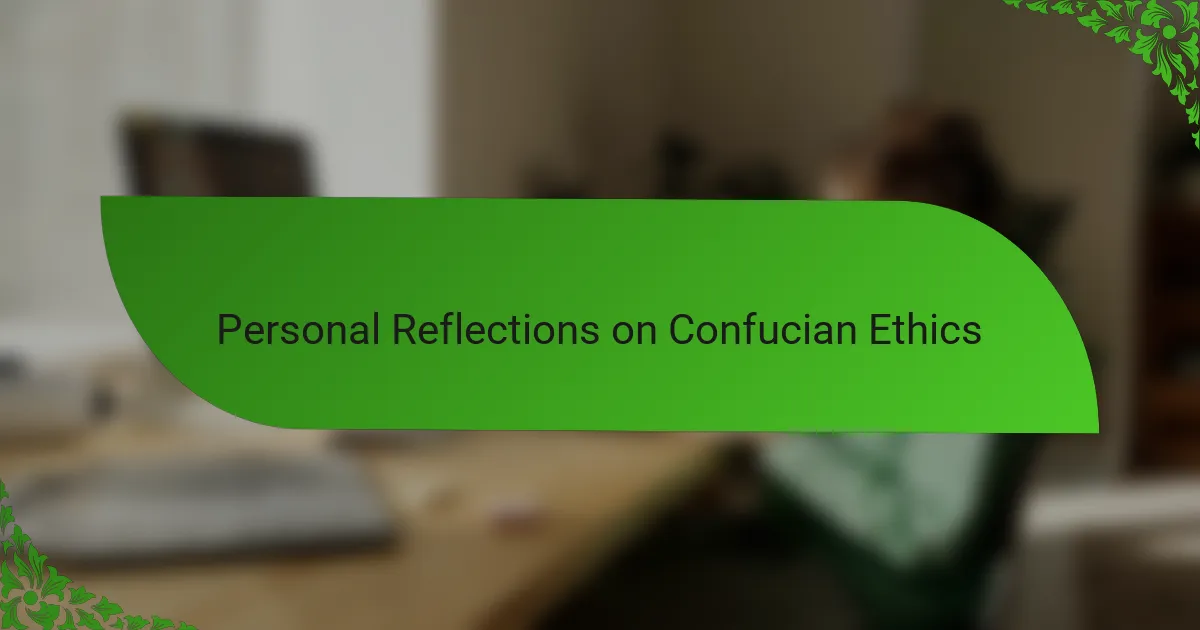
Personal Reflections on Confucian Ethics
Reflecting on Confucian ethics has deepened my appreciation for how virtues like ren and yi aren’t just ideals but living practices that shape my daily choices. I recall a moment when I consciously chose kindness over impatience during a stressful meeting, and it completely changed the atmosphere. Isn’t it remarkable how such a small shift can ripple outward and foster real connection?
What struck me most personally was how Confucian ethics invites continuous self-examination—not with judgment, but with genuine curiosity about who I want to become. I often find myself asking, “Am I living up to the virtues I admire?” This kind of reflection feels both challenging and rewarding, like a personal dialogue that keeps me grounded and motivated.
At times, I wrestled with the tension between cultural traditions embedded in Confucian ethics and my own evolving identity. How do I honor time-honored principles without feeling boxed in? Navigating this balance hasn’t been easy, yet it opened a space for me to reinterpret these teachings in a way that feels authentic and meaningful in today’s world.
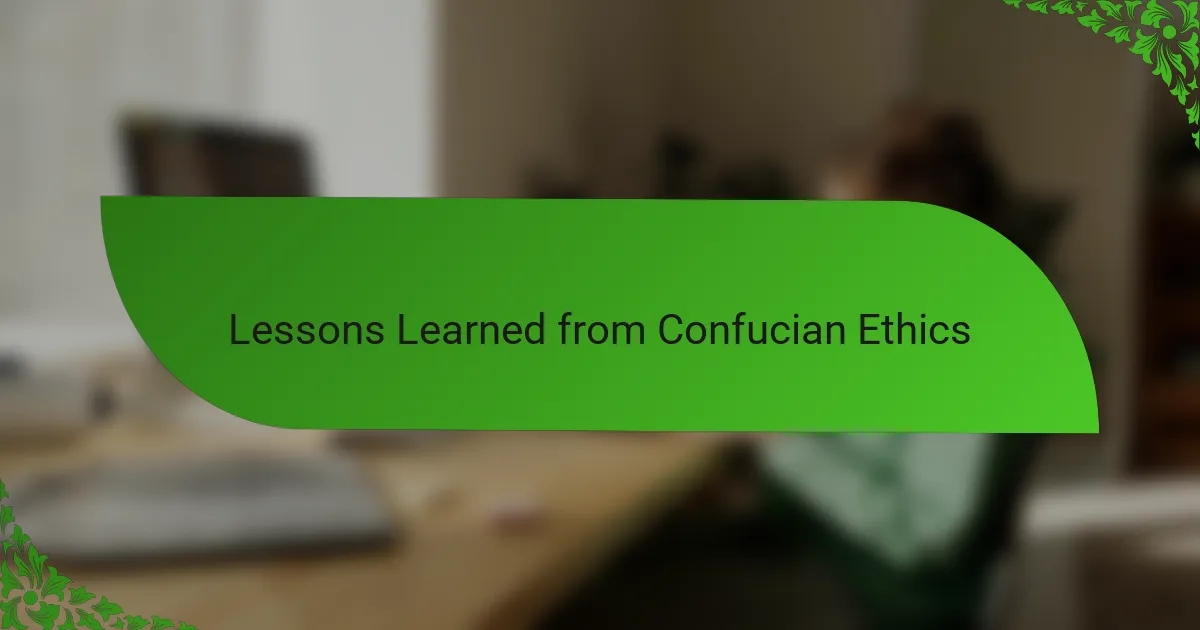
Lessons Learned from Confucian Ethics
Confucian ethics taught me that true virtue isn’t just about grand gestures but about consistency in everyday actions. Have you ever noticed how the smallest acts—like a sincere apology or a gentle word—can rebuild trust more than any formal apology? This mindfulness in daily conduct reshaped how I view personal integrity.
I also learned that ethical living requires ongoing effort, not a one-time decision. There were moments when sticking to righteousness (yi) meant standing alone, and I wondered if it was worth the struggle. Yet, choosing what’s right slowly built a foundation of confidence that has stayed with me through many challenges.
Finally, the emphasis on harmony made me appreciate the power of respect and propriety (li) in resolving conflicts before they arise. Have you ever experienced how a simple bow or attentive listening can cool tensions and invite understanding? Embracing these subtle practices helped me cultivate more peaceful, meaningful relationships.